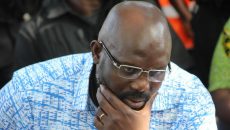MONROVIA, Montserrado – After the House of Representatives passed a bill to repeal tenured positions in the executive branch, the Center for Transparency and Accountability in Liberia has issued a strong call for the government to stop undermining the fight against corruption.
The bill to repeal tenured positions was submitted to the legislature by President George Weah.
Currently, the heads of the Public Procurement and Concessions Commission, the Liberia Anti-Corruption Commission, the Financial Intelligence Unit, and the Liberia Extractives Industries Transparency Initiative cannot be arbitrarily dismissed by the president. Dismissals must be for specific causes relating to their ability to perform their duties or failure to adhere to specific ethical guidelines and must be approved by the Senate.
In a press release issued on Monday, Nov. 26, CENTAL, which is the local affiliate of Transparency International, noted that “removing tenures from the LACC, PPCC and other public integrity institutions will not only make them vulnerable to manipulation by the presidency and other higher-ups in government, but also worsen the country’s disappointing fight against corruption.â€
“And this will have serious implications for the country’s reputation and government’s professed commitment to robustly tackle corruption and other financial and economic crimes in the country,†CENTAL added.
Weah had told the lawmakers that the tenured positions are impeding his development agenda. He added that the bill would allow him to exercise all powers necessary and convenient for the effective administration of the executive branch of government.
However, the House of Representatives amended the bill Weah had submitted to exclude the Central Bank of Liberia, the National Elections Commission, and the General Auditing Commission.
The House’s decision to pass the bill followed a report from a joint Committee on Judiciary and Good Governance. The report noted that tenured positions was not the only way to confer autonomy. It said, except for tenured positions within so-called integrity institutions, those created by the legislature in the past have been inconsistent and operated more to protect individuals than to guarantee independence.
The joint committee’s report called for the passage of the bill with a title: “Tenure in Government Act.†The committee recommended that other integrity institutions that were not excluded, such as the Liberia Anti-Corruption Commission and the Public Procurement and Concessions Commission, be revisited in separate legislation, as the constitution forbids a bill or resolution from embracing more than one subject than what is expressed in its title.
Presenting the report on behalf of the joint committee, Gbarpolu’s second district representative, Kanie Wesso, said the committee’s critical examination and research show that tenures slow the activities of the government.
“We did our own research – the issue of tenure conferred on most of our institutions is slowing down the operation of the government, the president finds it difficult to exercise his right,†Wesso said.
“We realized that people who are in tenure positions are protecting themselves and the issue is not about protecting yourselves. We want all of you to join us in passing this act in totality.â€
However, CENTAL expressed a deep concern about the direction of the country.
“While other countries around the world are anxious to make their integrity institutions more independent and autonomous, we are treading the opposite path,†the organization wrote. “This does not augur well for us now or in the near future. We do not see how already ineffective public integrity institutions will improve if made vulnerable to the presidency and other higher-ups in government.â€
CENTAL not only called for the president to abandon his plan to eliminate tenured positions at public integrity institutions, but it also called for the National Legislature to begin properly scrutinizing and conducting due diligence on bills submitted by the president.
“Endorsement of nearly everything from the presidency is troubling and counterproductive to their effective oversight and due diligence role, as provided for in Article 34 of the 1986 Liberian Constitution,†CENTAL wrote.
Featured photo by Zeze Ballah



